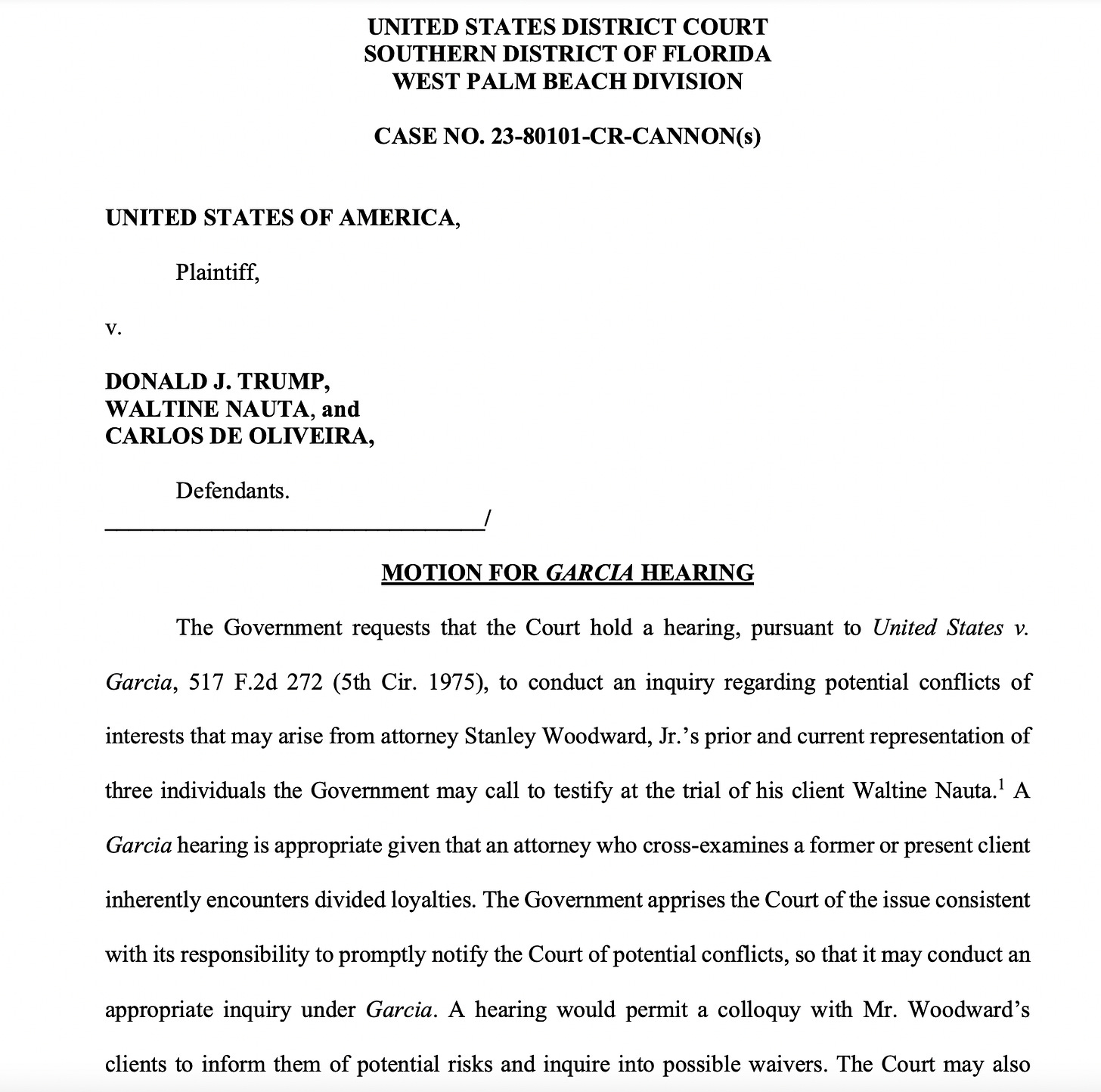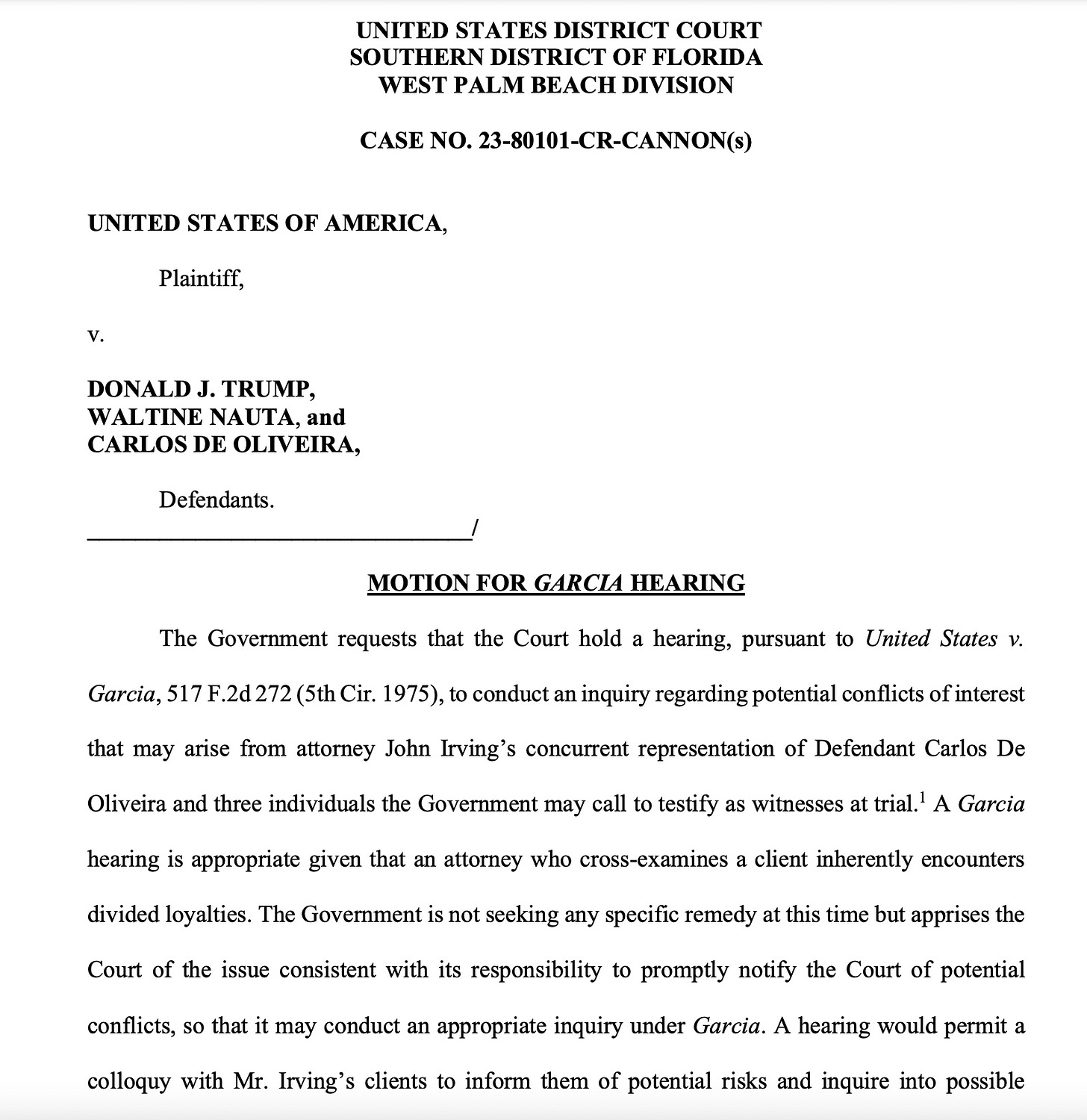Tonight we focus on two very different issues that will substantially impact the prosecutions against Donald Trump in Florida and in Georgia. There is no set timeline on the first issue. It involves whether the district court in the Mar-a-Lago case will hold a Garcia hearing—which involves whether lawyers have conflicts of interest that could prevent them from representing a client, or at least require the client to make a knowing waiver of his rights if the lawyer is going to continue. The second of the two, the removal issue in the Georgia state prosecution, is on a fast track for a decision by the 11th Circuit Court of Appeals. In Georgia, both the state court and the federal court are moving at rapid speed, while in Florida, Judge Cannon seems to be unnecessarily dragging her feet.
Florida and Classified Documents: I am still a doubter when it comes to Judge Cannon. The Garcia issue is one of the reasons. The government filed its original motion back on August 2, 2023, advising the court that it had learned information giving rise to concerns there could be a conflict of interest with Walt Nauta’s attorney, because of other clients he represented. Prosecutors asked the court to hold a hearing to determine the extent of the conflict.
Subsequently, a similar motion was filed to include De Oliveira.
The defendants’ lawyers were permitted to respond. The Special Counsel filed his final reply brief in support of the request for Garcia hearings on September 6, a week ago. So far, there’s nothing on the court’s docket reflecting any consideration of the issue or action on the request by Judge Cannon. She has not set a hearing.
That’s in stark contrast to what she was quick to do after the government filed its initial motion. Five days later, on August 7, she entered an order denying a fairly routine motion by the Special Counsel to file some material in connection with its request for a Garcia hearing under seal (out of public view). After directing Nauta to respond to the Garcia hearing request, Judge Cannon wrote, “Among other topics as raised in the Motion, the response shall address the legal propriety of using an out-of-district grand jury proceeding to continue to investigate and/or to seek post-indictment hearings on matters pertinent to the instant indicted matter in this district.” She told Trump and De Oliveira that they weren’t required to, but that if they wished, they too could brief the grand jury issue that she had raised.
Initially, this portion of her order caused a lot of confusion. What out-of-district grand jury was she talking about? It’s now clear that a fourth individual involved in the Mar-a-Lago case who is now a witness, IT worker Yuscil Taveras, was being scrutinized by a grand jury in the District of Columbia. We now know that the upshot of that was that the judge in charge of the grand jury there directed that Taveras, who like Nauta and De Oliveira had a lawyer with an association with the Trump camp, be permitted to consult with a neutral lawyer, a public defender. After doing that, Taveras, who had been told he might be indicted on obstruction charges, flipped and began to cooperate with the government. It was his cooperation that led to the superseding indictment in the classified documents case that added more obstruction charges and named De Oliveira as a defendant.
The situation with Yuscil Taveras helps to make out the case for, at a minimum, holding a hearing to learn more about the conflicts that Nauta and De Oliveira’s lawyers may have, if not having those defendants consult with a neutral lawyer about their situation, as Taveras did. The longer the question goes unanswered, the more potential compromise of those defendants’ rights may occur. But Judge Cannon seems more concerned about the request for a Garcia hearing and the use of a grand jury by prosecutors that appears to be unobjectionable than she is about a potential conflict of interest, which needs to be resolved on the record.
There is no reason for Judge Cannon’s delay. The conflict issue needs to be resolved, once raised. Taveras offers evidence of obstruction of justice against both Nauta and De Oliveira. Might they decide to cooperate against Trump if a lawyer lays it out to them straight? Tick tock.
Fulton County, Georgia: Mark Meadows is consuming a lot of oxygen in the Georgia case with his attempt to remove the prosecution from state court to federal court. Having lost in federal district court, he is now appealing to the 11th Circuit. His opening salvo was to file a motion to stay anything further from happening pending the outcome of his appeal. Oral argument on Meadows’ motion for an emergency stay pending the outcome of the appeal will take place this Friday at 10:15a.m. on Zoom. You can access it here.
The panel that will hear the motion includes a Clinton appointee, Judge Charles Wilson, and two Obama appointees, Judge Adalberto Jordan and Judge Robin Rosenbaum. Panels are randomly assigned in this Circuit, but expect to hear some sort of conspiracy theory in this one from MAGA world. There’s no basis for it. This panel is assigned to hear this preliminary motion only.

This is not the panel that will hear the appeal itself. Those panels are also randomly set far in advance.
The court also asked the parties to submit briefs on whether the removal provision applies to a former federal official. Predictably, the Fulton County DA says it does not. The argument is based on the text of the statute, which does not refer to former officials. Willis argues that under standard rules of statutory construction, this means it should not apply to them. This is not a bad argument and strict textualists would make the argument that if Congress had meant for the law to apply to former officials, it could have said so, as it did in another section of the statute.
While this argument is appealing in a technical sense, Meadows may have the better part of the argument here. He traces the development of the statute and points out numerous reasons Congress intended to include former officials. The law is meant to prevent a state from interfering with the functioning of the federal government, and it makes sense that if federal officials must fear prosecution after they leave office, there is a real interference factor. Moreover, numerous cases have involved removal of former officials, and no court has ever stopped them. But the bottom line here is that there is little law directly on point, and it will be up to the panel.
Because this can get confusing, a little recap here may be helpful: this issue is about whether the case can be removed to federal court. If the panel decides the law doesn’t make removal an option for former officials, then Meadows’ efforts here are at an end. But here’s the problem: if this argument about former officials is the only basis for a decision by the 11th Circuit that Meadows can’t remove his case, any convictions would be very vulnerable on appeal, if the Supreme Court saw this issue the other way. If the Supreme Court were to decide the 11th Circuit got the removal issue wrong, they would order a new trial, in federal court, and it would be all kinds of messy in terms of jeopardy, and the fate of other defendants. No one wants to see this case go there. So, it will be important for the court, as the panel likely well knows, to base its decision on more than one rationale. If it buys Willis’ former official argument, so be it, but the stronger argument that Meadows cannot remove his case is the argument we’ve been discussing for what seems like weeks now, that Meadows isn’t entitled to remove to federal court because he was acting beyond the scope of his official position.
All of that is for just the issues that have come up in the context of Meadows’ motion for an emergency stay—that’s the warm up for the substantive appeal over whether the case should be removed to federal court. The substantive argument about the removal petition has been set on a separate, but expedited, briefing schedule. Meadows’ brief arguing for removal is due Monday. The DA’s brief is due a week later. Meadows will have three additional days to reply. Once the briefs are in, the court can decide the removal issue at any time. It could also decide to schedule oral argument before it makes its decision. Although the 11th Circuit hears argument in a lower percentage of cases that most circuits, it does tend to hear argument in “significant” cases, and any one judge can designate a case for argument.
The removal issue is important for Meadows, but it could also have additional significance, because it is unclear whether a successful petition to remove a case by one defendant means all of the defendants’ cases are removed to federal court. So yes, this is a picayune legal issue, but also one that could have tremendous significance for the outcome of the Georgia prosecution.
In any event, the entire case will be cleaner once the removal issue is no longer in play. Judge McAfee, back in state court, will be free to set up his schedule for which defendants get tried together and when and get to work on pretrial motions. He has a hearing on some of them scheduled on Thursday for the October trial defendants, but there are going to be a lot more of them.
Courts move at different speeds. There are lots of moving parts that aren’t always obvious. But it’s hard to miss the contrast between how speedily the Georgia case is moving and the absence of any movement on the Garcia issue in Florida. It’s fascinating that, at least for now, the 11th Circuit will have the final say over how the trial courts conduct themselves on these issues. The 11th Circuit has set itself a far more rigorous schedule that the one Judge Cannon is following. She might do well to take note.
We’re in this together,
Joyce






Re Georgia - This is exhausting.
Re Cannon - it presents as she is purposely delaying for her client. To a non lawyer it’s bizarre she’s able to get away with this. Decisions should have been made months ago or at least much, much more timely. Add that Trump has not complained once about Cannon only had rocket fuel to the fire. Where the hell is Jack. Where is the 11 th.
It would seem that Judge Cannon is in way over her head. Or worse she is obstructing to the benefit of Trump. After all I’m sure he refers to her as “ one of my judges”.